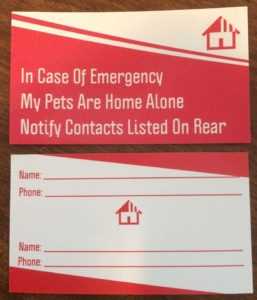Use the Buddy System During a Pet Emergency
Do you have a plan for someone to take care of your pets if you’re in an unexpected accident or become very ill? If you don’t, you probably should. Car accidents, medical emergencies, unexpected disasters, etc. are all situations where you may not be able to get back home to take care of your pet. Make sure you have a buddy-system for your pet in place before you need it. This article will give you some ideas of how to prepare to have someone else step in to care for your pets in an emergency if you’re not able to yourself.
Being a special-needs rescue, Rescued Rollers has anywhere between 5 and 15 dogs spread through our network of foster families at any point in time. What happens when one of our fosters has a medical emergency and can’t get back home to take care of their dog? We need to be prepared to have someone take care of that dog until they can be reunited. That’s gets a little more complicated when you realize that most of our dogs are on several different medicines and feeding regimens. It is very important that there is some pre-planning done before the unexpected happens.
Here, in a nutshell, is some of the minimum information that you should have prepared ahead of time in case you need help with your pet. If only takes a few minutes per pet to set up, and it could save their lives and let you have the peace of mind that they are being cared for in your absence.
-
- Use an index card to list each pet’s food and medicine routines.
For example: Josie gets 1/2 cup of kibble twice a day. Morning and evening. Add enough water to moisten the food. In the morning meal she gets two 25mg pills of her Novox pain medicine, and one pill of the Pepcid AC (10mg). With her evening meal she gets one pill only of her Pepcid AC. Her pills can usually be found in the green pill container on our kitchen counter. - List your pet’s special medical requirements! Many of our dogs are incontinent, so we might note about changing diapers or applying diaper rash medicines. We might mention where we keep the doggie wheelchair or lifting harness. We might tell them that Josie needs her bladder expressed every 3 to 4 hours. Make sure you write down any of the special care requirements for your pet.
- List your vet’s contact information on the back of this index card, and a family or friend’s contact information, too. This is important if your “buddy” needs to get medical care for your pets.
- Make a general index card listing locations of where the food is kept, medicines are located, leashes or crates, or anything else important can be found.
- Leave a key with someone or in an agreed-upon location. They can’t help your pets if they can’t get into your house to care for them!
- You should also note if your pets are current on vaccinations and preventatives in case they will need to go into a boarding situation.
- Use an index card to list each pet’s food and medicine routines.
Put together all that information and anything else someone caring for your pets needs to know, then put the buddy-system in place. Pick a neighbor or a family member, and make sure they know where to find this information. Make sure they can access your house in an emergency. Either give them a key, or let them know where you’ve hid the emergency spare key. They can’t help your pets if they can’t get into your house! If that person also has pets, you can offer to do the same for them. Also, make sure you keep the medication list or special care requirements updated as they change for your pet.
Last, but not least, you should have something in your wallet or purse that let’s first-responders know that you have pets home alone. If you get in a car accident or have a medical emergency, who will they contact? If it isn’t your designated pet-buddy, then you need to make sure that your emergency contact can notify the person that will take care of your pets. We usually use a card like this in our wallets or purses:

Putting the pet buddy-system in place doesn’t take much time or effort, but it will make sure your pets are taken care of in the event that you cannot be there yourself.


